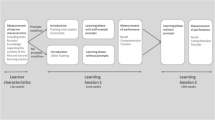Abstract
We investigated how college students’ (n = 40) different levels of action unit 4 (AU4: brow lowerer), metacognitive monitoring process use and pre-test score were associated with metacognitive monitoring accuracy during learning with a hypermedia-based ITS. Results revealed that participants with high pre-test scores had the highest accuracy scores with low levels of AU4 and use of more metacognitive monitoring processes, whereas participants with low pre-test scores had higher accuracy scores with high levels of AU4 and use of more metacognitive monitoring processes. Implications include designing adaptive ITSs that provide different types of scaffolding based on levels of prior knowledge, use of metacognitive monitoring processes, and emotional expressivity keeping in mind that levels of emotions change over time, and therefore must be monitored to provide effective scaffolding during learning.
Access this chapter
Tax calculation will be finalised at checkout
Purchases are for personal use only
Similar content being viewed by others
Notes
- 1.
This is a subset of a sample of 62 participants, as we did not include participants who did not have facial expression data.
References
Azevedo, R., Taub, M., Mudrick, N.V.: Understanding and reasoning about real-time cognitive, affective, and metacognitive processes to foster self-regulation with advanced learning technologies. In: Alexander, P.A., Schunk, D.H., Greene, J.A. (eds.) Handbook of Self-regulation of Learning and Performance, 2nd edn, pp. 254–270. Routledge, New York (2018)
Taub, M., Mudrick, N.V., Azevedo, R., Millar, G.C., Rowe, J., Lester, J.: Using multi-channel data with multi-level modeling to assess in-game performance during gameplay with Crystal Island. Comput. Hum. Behav. 76, 641–655 (2017)
D’Mello, S., Lehman, B., Sullins, J., Daigle, R., Combs, R., Vogt, K., Perkins, L., Graesser, A.: A time for emoting: when affect-sensitivity is and isn’t effective at promoting deep learning. In: Aleven, V., Kay, J., Mostow, J. (eds.) ITS 2010. LNCS, vol. 6094, pp. 245–254. Springer, Heidelberg (2010). https://doi.org/10.1007/978-3-642-13388-6_29
Chauncey Strain, A., Azevedo, R., D’Mello, S.: Exploring relationships between learners’ affective states, metacognitive processes, and learning outcomes. In: Cerri, S.A., Clancey, W.J., Papadourakis, G., Panourgia, K. (eds.) ITS 2012. LNCS (LNAI; LNB), vol. 7315, pp. 59–64. Springer, Heidelberg (2012). https://doi.org/10.1007/978-3-642-30950-2_8
Grafsgaard, J.F., Wiggins, J.B., Boyer, K.E., Wiebe, E.N., Lester, J.C.: Automatically recognizing facial expression: predicting engagement and frustration. In: 6th International Conference Educational Data Mining, EDM 2013, pp. 43–50 (2013)
Winne, P.H.: Cognition and metacognition within self-regulated learning. In: Alexander, P.A., Schunk, D.H., Greene, J.A. (eds.) Handbook of Self-regulation of Learning and Performance, 2nd edn, pp. 36–48. Routledge, New York (2018)
D’Mello, S., Graesser, A.: Dynamics of affective states during complex learning. Learn. Instr. 22, 145–157 (2012)
D’Mello, S.K., Craig, S.D., Graesser, A.C.: Multi-method assessment of affective experience and expressin during deep learning. Int. J. Learn. Technol. 4, 165–187 (2009)
D’Mello, S., Kappas, A., Gratch, J.: The affective computing approach to affect measurement. Emot. Rev. 1–10 (2017)
Acknowledgments
This research was supported by funding from the National Science Foundation (DRL#1431552; DRL#1660878, DRL#1661202) and the Social Sciences and Humanities Research Council of Canada (SSHRC 895-2011-1006). The authors would like to thank the members from the SMART Lab at NCSU for their assistance with data collection.
Author information
Authors and Affiliations
Corresponding author
Editor information
Editors and Affiliations
Rights and permissions
Copyright information
© 2018 Springer International Publishing AG, part of Springer Nature
About this paper
Cite this paper
Taub, M., Azevedo, R., Mudrick, N.V. (2018). How Do Different Levels of AU4 Impact Metacognitive Monitoring During Learning with Intelligent Tutoring Systems?. In: Nkambou, R., Azevedo, R., Vassileva, J. (eds) Intelligent Tutoring Systems. ITS 2018. Lecture Notes in Computer Science(), vol 10858. Springer, Cham. https://doi.org/10.1007/978-3-319-91464-0_22
Download citation
DOI: https://doi.org/10.1007/978-3-319-91464-0_22
Published:
Publisher Name: Springer, Cham
Print ISBN: 978-3-319-91463-3
Online ISBN: 978-3-319-91464-0
eBook Packages: Computer ScienceComputer Science (R0)




